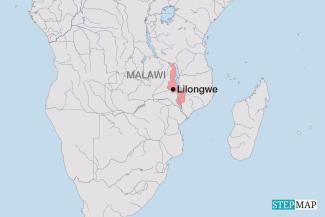Elections
Malawi’s election mood is shaped by food, fuel and job struggles
 StepMap
StepMap
It is nine o’clock in the morning, and 34-year-old vendor Bertha Kamanga is arranging tomatoes on a wooden stall in Ndirande market in Malawi’s commercial capital, Blantyre. As she bargains with a customer, her conversation shifts to politics.
“Life is harder than before. Every politician now is promising lower prices. But look around,” she says, pointing to baskets of rotting tomatoes. “Business is slow because people don’t have money to buy.”
Discussions about politics and how it shapes everyday life are currently dominating conversations across the country. Malawi heads to the polls on 16 September 2025 in a general election that many see as a test of public trust. For weeks politicians have unfolded their campaigns against a backdrop of high inflation, food insecurity and fuel shortages. On election day, 7.2 million registered voters can weigh politicians’ promises against economic realities and whether political promises can bring tangible change.
Fuel shortages and agriculture are key issues
In rural districts, for example, farmers are concerned with the rising cost of fertilisers. “Early last year a 50-kilogramme bag cost around 90,000 Malawian kwacha (about $ 52),” says smallholder farmer Agnes Liwanda from Kasungu district. “Now it’s closer to MK 150,000 ($86). We don’t know if politicians will solve this. They say many things during campaigns, but after elections we are left alone.”
Agriculture is the backbone of Malawi’s economy, employing more than 80 % of the population and contributing about a quarter of the country’s GDP. However, rising fertiliser costs and erratic rainfall left 5.7 million people without food last year. This year, a preliminary report on crop harvest estimates suggests a 20 % decline of maize production compared to the average of the past five years. Agriculture therefore becomes as a key election issue.
In the cities, conversations about fuel prices and shortages dominate. Taxi driver Lackson Nkhata worries about costs. “A litre of petrol is at MK 2530 ($ 1.46). Last year it was already high, but at least we could move. Now the queues are long, and sometimes there is no fuel at all.” Since 2023, Malawi has struggled with intermittent fuel shortage because of a lack of foreign exchange. The crisis has forced drivers to spend nights in queues, disrupting businesses and commuters alike.
High prices, high youth unemployment
At workplaces, people often complain about unfulfilled pledges of the 2020 election when the current administration of President Lazarus Chakwera came into power. “They promised to end blackouts, create jobs and reduce prices,” says Clementina Mwale, who works as a secretary at a manufacturing company in Blantyre. “But we still face load shedding while food prices keep climbing.”
The Reserve Bank of Malawi has revised the 2025 annual average inflation rate to 28.5 %. A 50-kilogramme bag of maize, the national staple, is selling at nearly MK 85,000 ($49), about three times what it cost two years ago.
At the University of Malawi, students debate whether the vote can change their fortunes. “We graduate, but jobs are scarce. Youth unemployment is very high,” says economics student Chisomo Nyondo. “Campaigns talk about entrepreneurship, but with no capital and a weak economy, it feels like empty promises.”
Whoever wins, change will take time
Meanwhile, Malawi’s major political players, the ruling Malawi Congress Party of President Lazarus Chakwera, the United Transformation Movement led by former Reserve Bank governor Dalitso Kabambe, and the opposition Democratic Progressive Party of former president Peter Mutharika, have unveiled manifestos promising quick economic fixes.
Economist Adam Chikapa says Malawi should not expect overnight change. “The kwacha has lost nearly half its value since 2022, making imports costlier. External debt is high, squeezing government finances. Whoever wins must make tough choices: either pursue reforms that may initially hurt or continue short-term subsidies that strain the budget.”
However, in Ndirande market, vendor Maria Samu who sells second-hand clothes, sums up the mood shared by the voters. “We are tired of false promises but maybe this time, whoever wins, will make a difference.”
Lameck Masina is a freelance journalist based in Blantyre, Malawi.
lameckm71@gmail.com


